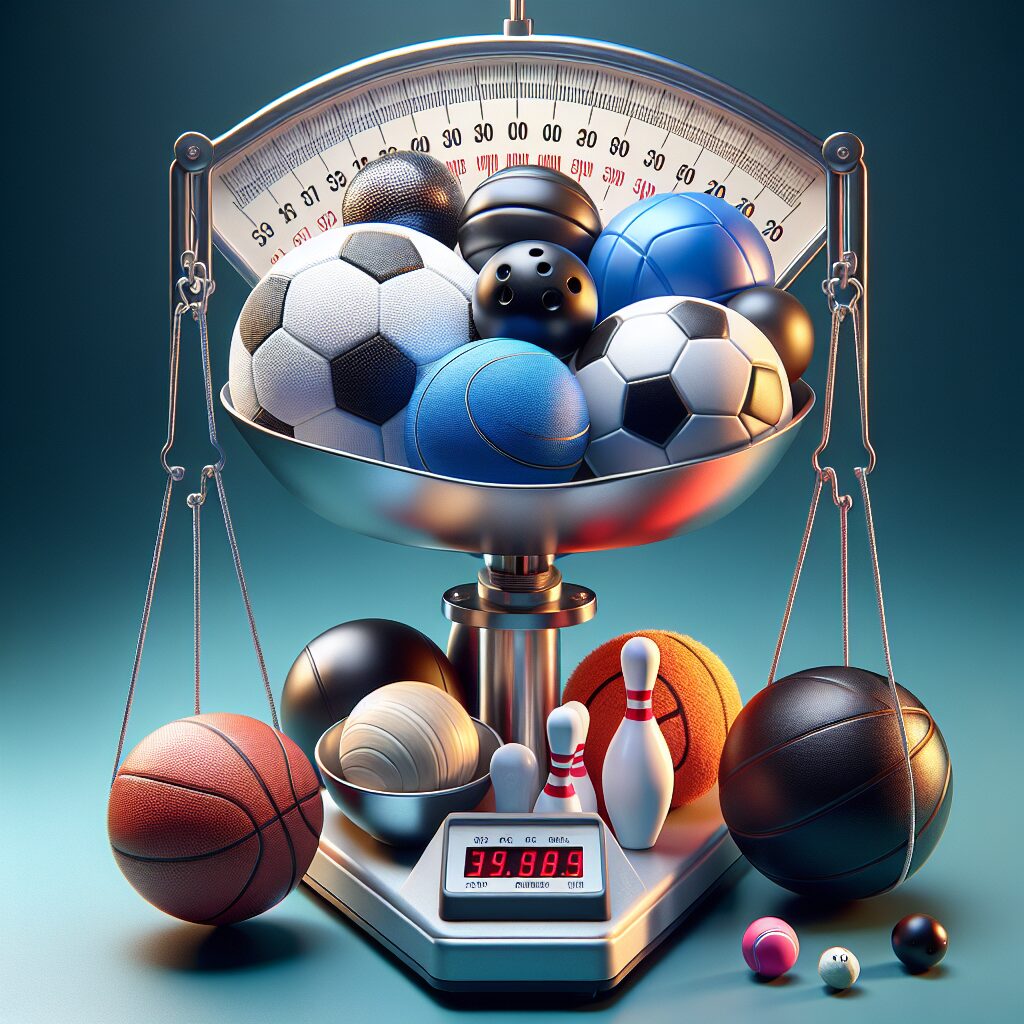Weight in Different Sports: A Comparative Guide
Weight plays a crucial role in sports, both in terms of individual performance and overall competition. In various sports, athletes must carefully consider their weight to optimize their performance and achieve desired outcomes. From combat sports to endurance races, the impact of weight can be seen in different ways, making it an important factor to take into account for athletes. Understanding the significance of weight in different sports not only provides insights into the specific impacts it has, but also enables athletes to make informed decisions about their training and competing strategies.
When it comes to combat sports such as boxing or martial arts, weight categories have a profound effect on an athlete’s performance and safety. Competitors are divided into different weight classes to ensure fair match-ups and to minimize the risk of injuries. This weight categorization allows athletes to compete against opponents who have a similar physical build and strength, optimizing the level of competition. Moreover, weight management becomes an integral part of training in combat sports, as athletes often have to reduce or increase their weight within a specific range to fit into a desired weight category. This process requires meticulous planning, strategic dieting, and disciplined training regimes.
Moving beyond combat sports, weight also influences the performance of athletes in sports like gymnastics or diving. In these sports, athletes need to strike a balance between strength and weight to execute intricate movements and maintain body control. Having a lower body weight can enhance agility, which is critical for executing complex routines and achieving higher scores. However, athletes must ensure that weight reduction does not compromise their strength and endurance, as these attributes are equally essential for performing at the highest level.
In the following sections, we will delve deeper into the key takeaways related to weight in various sports. We will discuss the impact of weight in endurance sports, team sports, and other individual sports. By exploring these different areas, we aim to provide a comprehensive understanding of how weight influences athletes’ performances in a range of sports disciplines.
Key Takeaways
1. Weight plays a crucial role in various sports, affecting performance and success in different ways.
2. Combat sports demand athletes to strategically manage their weight, with practices like weight cutting being prevalent but potentially dangerous.
3. In sports like weightlifting and powerlifting, athletes compete in specific weight categories, requiring them to maximize their strength while staying within those limits.
4. In endurance sports such as long-distance running and cycling, maintaining a lower body weight can enhance performance and optimize energy efficiency.
5. Team sports like basketball and football have diverse weight requirements for different positions, with athletes striving to find the ideal balance between size, strength, and speed.
What is the Impact of Weight on Performance in Different Sports?
Weight Categories in Combat Sports
Combat sports such as boxing, mixed martial arts (MMA), and wrestling often have weight categories. Athletes within each weight category compete against opponents who have similar body weight, ensuring fair competition. Being in the right weight class is crucial as it affects an athlete’s speed, power, and endurance. This section will provide an in-depth analysis of weight categories in combat sports and their significance.
The Significance of Weight Categories
Weight categories ensure that athletes are not at a disadvantage due to significant differences in size and weight. Competing against opponents of similar weight allows for more balanced matches and reduces the risk of injuries. Additionally, weight categories create a more level playing field, enhancing the overall fairness and competitiveness of combat sports.
Weight Cutting and its Effects
Weight cutting is a common practice in combat sports where athletes deliberately lose weight to fit into a lower weight category. This section will explore the methods and potential risks associated with weight cutting. It will discuss how extreme weight cutting can negatively impact the athlete’s performance, health, and potentially lead to dehydration and organ damage.
Weightlifting and Bodyweight Sports
Weightlifting and bodyweight sports require athletes to have specific body compositions to excel in their respective disciplines. This section will delve into the importance of weight in these sports and how it directly affects an athlete’s strength, power, and performance.
Bodyweight Sports: The Role of Weight
In sports like gymnastics, calisthenics, and rock climbing, an athlete’s body weight plays a crucial role in their performance. Maintaining the right weight-to-strength ratio is essential to effectively execute complex bodyweight movements and maneuvers. This section will discuss the ideal bodyweight range for different bodyweight sports and the consequences of being underweight or overweight.
Weightlifting: The Influence of Weight
Weightlifting is a sport where athletes compete in various weight categories, aiming to lift the heaviest weights possible. This section will explore how an athlete’s body weight impacts their strength and ability to move heavy loads. It will also cover how weight categories and body weight fluctuations can affect an athlete’s training techniques, strategies, and performance outcomes.
Endurance Sports and Optimal Weight
In endurance sports such as running, cycling, and swimming, an athlete’s weight can significantly affect their performance. This section will examine the relationship between body weight and endurance sports, discussing the ideal weight for optimal performance while considering factors such as efficiency, power-to-weight ratio, and energy consumption.
Weight and Running Performance
For long-distance runners, maintaining an optimal body weight is crucial for maximizing endurance and speed. This section will discuss the impact of weight on running performance, exploring the effects of being underweight or overweight. It will also provide insights into achieving a healthy weight for runners to enhance their performance and prevent injuries.
Weight and Cycling/Swimming Performance
In sports like cycling and swimming, where overcoming resistance is key, an athlete’s weight can significantly affect their speed and efficiency. This section will explore how weight influences performance in these endurance sports, discussing the optimal weight range for cyclists and swimmers. It will also offer strategies for achieving and maintaining the optimal weight for improved performance.
Conclusion
1. How does weight play a role in different sports?
2. What are the implications of weight categories in combat sports?
3. What are the risks and effects of weight cutting in combat sports?
4. How does weight impact performance in bodyweight sports like gymnastics and weightlifting?
5. How does weight affect performance in endurance sports like running, cycling, and swimming?
6. What are the ideal weight ranges for optimal performance in different sports?
7. What are the strategies for maintaining a healthy weight in sports?
8. How can athletes optimize their performance by managing their weight effectively?
By considering the impact of weight in different sports and understanding the significance of weight categories, bodyweight composition, and optimal weight ranges, athletes can enhance their performance, reduce the risk of injuries, and excel in their chosen disciplines.
Frequently Asked Questions
1. How does weight affect performance in different sports?
The impact of weight on performance varies across sports. In some sports like weightlifting, a higher body weight can be advantageous, as it allows for greater power and strength. However, in sports like running or gymnastics, a lighter body weight can contribute to better agility and flexibility.
2. Can being overweight hinder performance in certain sports?
Being overweight can indeed hinder performance in many sports. It can reduce speed, endurance, and overall mobility, making movements more difficult. Moreover, excess weight can put increased stress on joints and lead to a higher risk of injuries.
3. Are there any weight categories in combat sports?
Yes, many combat sports have weight categories to ensure fair and balanced competition. Fighters are typically grouped into specific weight divisions to ensure that opponents are of similar size and strength. This allows for a more even playing field and reduces the risk of unfair advantages.
4. How does weight affect a golfer’s swing?
A golfer’s weight can significantly impact their swing. Too much body weight can limit rotation and flexibility, affecting the range of motion and ultimately the power behind the swing. On the other hand, insufficient weight may result in less stability and control over the club, affecting accuracy.
5. Does weight play a role in ball sports like basketball or soccer?
Weight can play a role in ball sports, but it is not the sole determining factor for success. In sports like basketball or soccer, factors like height, agility, skill, and teamwork matter more than weight alone. However, certain positions or playing styles may have specific weight requirements or preferences.
6. Are there ideal weight ranges for different sports?
There is no single ideal weight range that applies to all sports. The ideal weight varies depending on factors like body composition, height, and the specific demands of the sport. Athletes should focus on maintaining a healthy weight for their body type while also considering the requirements of their chosen sport.
7. Can losing weight improve performance in any sports?
Losing weight can potentially improve performance in certain sports where body weight plays a significant role. Sports like boxing, wrestling, or rowing often have weight classes where shedding excess weight can lead to improved agility and speed. However, it is crucial to approach weight loss safely and without compromising overall health.
8. What are the potential health risks of extreme weight manipulation in sports?
Extreme weight manipulation methods like dehydration, excessive dieting, or the use of diuretics can pose severe health risks. These practices can lead to dehydration, electrolyte imbalances, weakened immune system, loss of muscle mass, and even organ damage. It is crucial for athletes to prioritize their health and work with professionals to achieve and maintain a healthy weight.
9. How can an athlete maintain a healthy weight while participating in their sport?
To maintain a healthy weight while participating in a sport, athletes should focus on balanced nutrition, regular exercise, and proper recovery. Seeking guidance from nutritionists or trainers can help create personalized plans that meet the specific energy requirements of the sport while ensuring optimal health and performance.
10. Is weight the sole determinant of an athlete’s success?
No, weight alone is not the sole determinant of an athlete’s success. Factors like skill, technique, mental strength, dedication, and overall athleticism contribute significantly to an athlete’s performance. While weight can be a factor, it is only one piece of the puzzle in achieving success in any sport.
Final Thoughts
Weight is undeniably an important factor in various sports, but it is not the ultimate determinant of success. Athletes should focus on finding their own ideal weight range that aligns with their body composition, overall health, and the specific demands of their chosen sport.
Moreover, it is vital to remember that each sport has different weight requirements and preferences. Rather than solely fixating on weight, athletes should prioritize improving their skills, technique, and overall fitness level. The right balance of weight, strength, and agility, combined with dedication and hard work, is the key to excelling in any sport.




